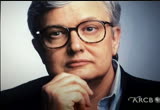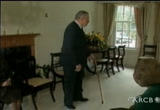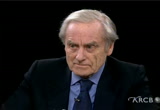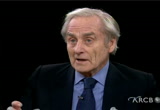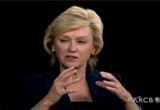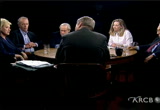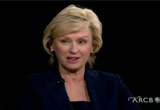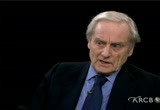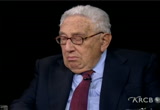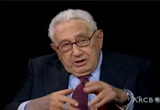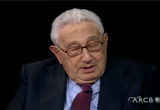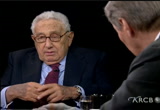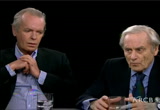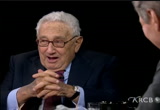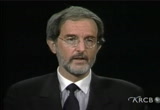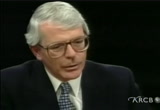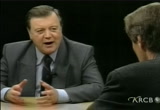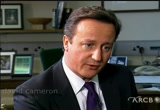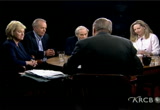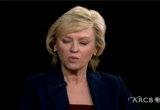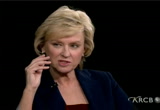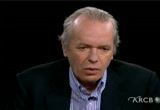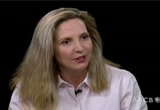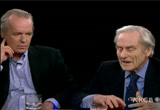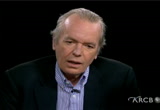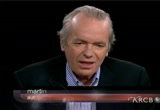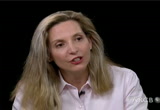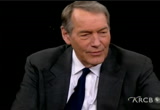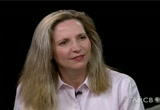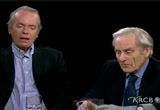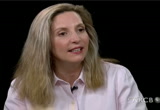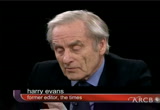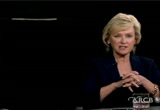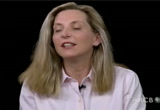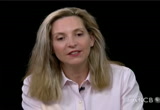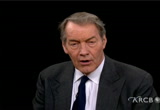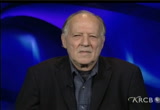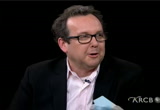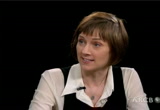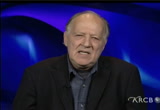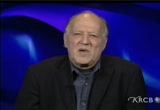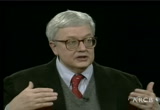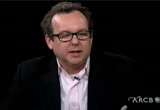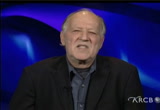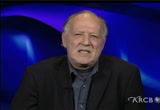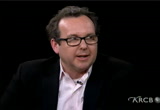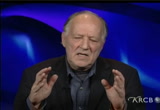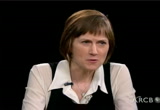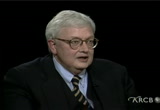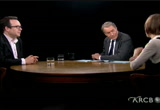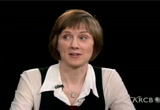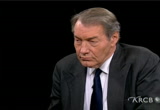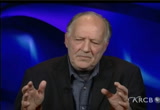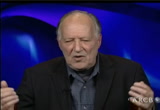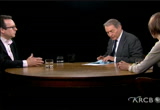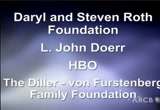tv Charlie Rose PBS April 8, 2013 11:00pm-12:00am PDT
11:00 pm
>> rose: welcome to the program. tonight we remember margaret thatcher, the former prime minister of britain without died today, age 87. joining us henry kissinger, harry evans, tina brown amanda foreman and martin amos. >> her record will always be up for debate. but what i think will be conceded, and she has already won, is the fact that she was a tectonic change in the way women are perceived in society. >> also we remember roger ebert and his contribution to film criticism with "new york times" critic a.o. scott, dana stevens of slate and film director werner herzog. >> i was called by him once
11:01 pm
a good soldier of cinema. and gave it right back and i said roger, the real good soldier of cinema, that's actually you. you are proceeding, you are holding out, an outpost that many others have abandonedment are you ti doing the tellent discourse about cinema. you are inspiring us. you are the soldier. and now you are disabled. you are the afflicted one, you are the wounded soldier. you cannot speak any more and what an outrage. >> rose: remembering thatcher and ebert when we continue. >> funding for charlie rose was provided by the following:.
11:02 pm
>> additional funding provided by these funders: captioning sponsored by rose communications from our studios in new york city, this is charlie rose. >> margaret thatcher business an's prime minister for 11 years died today. she was 87 years old. "the new york times" wrote she was a path breaker for the moment she took office in 1979. as britain's first and so far only female prime minister. and she was the rare consvati lear to com not from the upper echelons of britain class obsessed
11:03 pm
society but a modest apartment above her father's grocery shop. though she did not appear on this program i have spoke tone many people over the past 20 years who wrote about her, worked for her and succeeded her. i'm jinned now by distinguish wished group, people who know something about britain, its politics and politicians starting with henry kissinger, former secretary of state who could only be with us a few minutes, harold evans of the london times and sunday times, tina brown of "newsweek" and the dail beast, martin amos british novelist. i am pleased to have all of them here to talk about the late margaret thatcher. let me go to harry evans, you from editor of the london times and sunday times during margaret thatcher times. >> i first met her before she was anything. henry is referred to as minister of education. i met her when she was nothing. >> she was just becoming member of parliament, 1959. she was a hat and a voice.
11:04 pm
and she was a pipqueak. nobody knew anything about her. she was regarded with a certain amount of contempt by the tough aristocrats in the tory party because she came from trade. her father was a grocer, not an aristocrat. what impressed me on that first meeting. we were sitting around that table like this, i was a big head. i thought i was editor of the times. i was going to lead this discussion with "the financial times" all around. head of big company. head of a big company. she took over completely. she attacked them all one by one. what are you doing for british industry. wait a minute whatis ts, she is just this junior, nothing. and so they responded. >> you don't do that to the great harry. >> she gave them hell. and i sat there, i was amazed by her ferocity. and later, of course, i got to know her particularly well during all the-- for me, the terrific thing she did was to rescue britain from anarchy. henry touched on it. but in the 1978, 79y.
11:05 pm
there was just an appalling situation with the unions in riot, tina was there then. you saw it all. it was impossible. she came in and she changed it. >> tin well, i mean i think harry is right that what she did kick started britain again after this long period of malaise, of this kind of real socialist malaise that had been going on for some years whether people were on strike every ten minutes. three day week. the winter of discontent, all of those things. britain was really in the dog house. and she did address that problem very, very aggressively. what i find interesting about her is that she didn't just break the class ceiling for women, but she also broke the class ceiling which is a harder thing to do in britain. because as harry references, she, thereas such a lot o snobbery in the establishment. and she really cut through that, you know, they always rejected her. she got a scholarship to oxford. never made debate in societies or the dining clubs. and she was always considered a little bit not quite classy enough to be in certain things.
11:06 pm
she gets into the tory party. it was dennis thatcher really that did so much for maggie thatcher because he gave her a little bit of wealth and a little bit of position. and it was out of that that she was able to kind of climb the ladder of becoming a tory lader because otherwise she wasn't have been able to. she was interesting in that sense the way shmanaged to ugh all of that out. >> is she a hero to women because she was a strong woman. >> she's not-- one of the interesting thing is that feminists have never claimed her, even now. recently there was a list made newspaper britain by the deputy leader of the labor party of the ten greatest women in britain. and she wasn't even on it. which was ridiculous. >> ridiculous. >> absolutely absurd but they never claimed her. she never wanted to be seen as a feminist. she rejected that idea that she owed anything to women's lib. she said some of made it long before women's lib. she wasn't ever embraced b that cmunity. ev now there is a gdging acceptance of margaret thatcher. i personly think she did break amazing barriers for women. she actually did really cut through. she was so clear and toughed
11:07 pm
it out and those tory wets as she used to call them her party. she fell like jelly deals before her. >> martin? >> well, if you talk to modern politicians, any party, they say she is the greatest prime minister since churchill. the most substantial. and i sort of agree, although i found her re-- personally. but she did astina said, she broke the class system. those keiths and ses ils and normans. they wouldn't have had a look in a traditional tory cabinet level. >> she liked jews too which was very unusual for the tory party. >> rose: she liked jews. >> she did. she had a lot of jewish people in her parliament. >> she did do that, economists or foreign policy people or across-the-board. >> clever people. >> clever people. >> but she did tu, she defeated the trade unions by
11:08 pm
turning the working class on itself, divide and conquer. by rewarding scabbing, for instance. and by flogging off council houses, projects to the wealthier skilled workers. so that they were emancipated from the rump of the working class. >> she challenged-- challenged the party to become leader of the opposition at the time. and then she was challenged by the party herself in the end. >> yeah. >> and lost her leadership >> betrayed by the party. >> betrayed by the party. >> in my opinion. she got the hectored. you have seen the film the iron lady with meryl streep. here the cabinet minister talks and she slugged him off. shut up, you don't know a damn thing, exaggeratedding. but that was the affect she had. she could cut you off like that. >> the reason why feminists have, i think, failed to claim her as their own is the closeness, actually of
11:09 pm
maggie thatcher to feminism in the same way that stalinists hate trotskites, they are furious with maggie over the small print but actually they were obviously on the same side. they wanted equality for women. so did she. they wanted equal pay for equal work. she certainly wanted to have equal pay for her equal work. and we know it's a matter of historical record that in her early years at least she fought for a number of so-called women's issues. in private among her colleagues. she wanted working widows not to be penalized for working and losing their huand's pensions. she wanted wometo be able to pay for child care out of their pretax earnings, not their post tax earnings. and this was squashed in cabinet. she was of the doing kind, not prot testing kindment and therefore she was betrayed by the feminist movement when she was attacked in the 1970s by the education minister. >> absolutely. and they haven't stopped attacking her. it's quite interesting. you don't hear many women
11:10 pm
speaking up for mrs. thatcher. >> rose: didn't tony blair carry on a significant number of the things that she had created. >> as i said, second to churchill. >> it's very ieresting beuse eas once asked what her legacy was she replied with a smile, tony blair. because she won all those arguments and when he came to power he just assumed so much of what she had already won. >> rose: this was the time that the soviet union collapsed. and people look at reagan. they look at thatcher. they look at pope john paul 2nd. as part of what brought soviet union down and obviously gorbachev. how do you see that and the role of reagan and thatcher together in that? >> what brought the soviet union down was an accumulation of things that had gone on for a number of decades. >> they're own economy. >> it came to a point in the 80s. the contribution of reagan and thatcher was to define
11:11 pm
the issue in terms that the american public could understand rather than as a confrontation between-- between ideologies and she sanctioned reagan's hand, gave him an assured spokesman on the nato side. but she was not a spokesman for reagan. she was a spokesman for a british position that was parallel to ours. and it was ultimately it was certainly always clear that if reagan deviated from her conception of the proper way of conducting the cold war, we would hear strenuous objections as we did after-- for example. >> rose: how close was the relationship between reagan and thatcher?
11:12 pm
>> i think on the level of overall strategy they were very close. on the level of day-to-day tactics it didn't, the decisive element was that the soviet union found itself confronted by a united, by a united west t was milirily strong enough so that no military option existed for the soviet union and that they were working themselves in to an economic collapse by trying to conduct the arms trade. and that we had in thatcher and reagan and in calls to the missile debate that was going on, people who had demonstrated that they were not going to be driven off and that they had a strategy. and then thatcher in a way discered gorbachev. and was saying that when he
11:13 pm
was agriculture minister, when she was not yet at the top, and she who had been always in favor of fighting the cold war in fairly absolute terms said this is a man-- . >> rose: who i can do business with. >> we can deal with. that was an enormous contribution she then made to the eflution. but her contribution of foreign policy was not in tactics but in a basi attitude of where the west should stand and to make it clear that the west could stand and that britain could play a significant role in this. >> she had implacable will, when grenada happened she assured ronald reagan for not consulting the british who owned the island and i think henry will know more about this than i do.
11:14 pm
when she determined she was going to retake the faulklands in 1982 in this famous war, i don't thing haig was very-- about as helpful as henry would have been. she was implacable. >> i unfortunately have to leave. i was in britain, in england to give a speech. and hi lunch with a number of foreign office officials who were outlining various contributions-- compromises that might emerge out of the haig mission. and margaret thatcher invited me to tea. so thinking that hi been given the official position i asked her which of the various compromises she favoured. but at the word of compromise she became so irate that she said how is it possible that you as an old friend of mine would even utter this word here at ten downing street. she was so irate that i didn't tell her that i had
11:15 pm
heard it from her foreign secretary. and i took the hit for him and she was determined that no british territory would be given up while she was prime minister. >> she would go to war for that. >> and it didn't matter what -- >> if churchill said i'm not going to preside over the liquidate-- liquidation of the british empire she continued that tradition. >> she was absolutely adamant. i know you have to go but first here is a video over the years a number of people have talked about parg receipt thatcher. and here's what some of them have said. roll tape. >> it is politically convenient for margaret thatcher to be ronald reagan's ally which she unquestioniny was t in private she was scathe being him. >> what would she say. >> she was actually in her own way quite devious in the way she behaved. for example, maggie would seem to have been a stanch ally in terms of the strategic defense industry. once she got outside the to the idea. but she would go to
11:16 pm
the-- palace in paris and talk to mitterrand about it. she would say this is just a crazy idea. it's going to bring total breakdown of our lipps in the soviet union. going to lead to the mill tarization of the straits. what can we do to stop him. maggie was very slippery. >> rose: do you agree that the blair government has in a sense assumed the center right position as many people have said, that basically there is a direct line between thatcher and blair. >> if you mean have the labor party realize that the conservatives have won the intellectual argument to move their political base on to our grounds. >> i do mean that. >> they have done that. but when you say tony blair follows margaret thatcher that is not true. >> that there is a link between the policies that she began. >> no, no. he a dodd the policies that she had. we were both pushingthose policies further. he spent his political lifo posing those policies and is not proposing to push them any further. >> rose: will in the end margaret thatcher be more transform difficult than
11:17 pm
tony blair. >> you know, she transformed the industry in trade union context of the country. and that was, i think, you look back on it and say, well, okay that was a necessary change to make. for me it was a different thing. and i was really want fog keep the modernization that she did, but add to it a whole social public service, welfare modernization of my own. >> i think in the last year or two with hindsight, not having fall out with margaret, she was losing her touch. she up set her party on domestic things. she was herself fomenting the european division. >> rose: so if she had left after 10 years as you suggest would she still have the same historic position she obviously will occupy in an even more so you say because she wouldn't have lost it. >> i think it wouldn't have come to this dramatic conclusion when she fell from power. the drama of the end of margaret thatcher and the lingering reaction to margaret thatcher's fall were one of the things that adds to the story. when eventually told.
11:18 pm
because no doubt that margaret thatcher is one of two or three dominant british politicians of this century. >> the idea of getting rid of nuclear weapons was not popular, at least when we came home. and our mutual friend margaret thatcher came and you know there is a verb in the british language, you remember she carried that hard handbag. you can get a handbag and i got handbagged. but maybe now the reaction is different. maybe this is an ia whose ti has come. >> but-- you sure henry. >> to actually quote her. she said one more regular guy will not survive. >> rose: was thatcherism con compassionate. >> i mean margaret thatcher her self was a compassionate person. she recognized the country needed some very significant and deep changes. some of the things, some of the changes she made were very difficult getting inflation down, getting
11:19 pm
taxes down, privatizing industries, getting the unions under control. ese quired ve tou, very strong leadership. had she not done those things, britain would be a poorer country with people in a worse state. >> where is margaret thatch never public appreciation today? >> not very strong surprisingly. >> rose: it is surprising. >> the public is contrary about this. the fact is that we're reaping the benefits of all the fundamental changes she's made there was a lot of pain amount of lot of high unemployment at the time. you saw industries that this country had been famous for. i was brought up near a shipbuilding, part of gls go a scottland. all that is gone. we're happy to take the benefits of it, sometimes to deal too much on the pain of it means we we should delete it from our memory all together. >> tell me stories about margaret thatcher. when you saw what you know about her that is beyond the judgement of history about her. >> well, my only real exchange in mrs. thatcher was very early on when harry
11:20 pm
and i went to dinner. i was in my 20s at that time with the great sort of tory journalist woodrow wyatt--who wore embroidered slippers with his initials on, and grand dukes, everybody was puffing cigar. a certain point in the dinner woodrow wyatt said it is now time for the women, for the ladies to leave the table because at that time women left the table. and the men stayed behind. and we all scuttled off, duchesses and all the ladies scuttled off. and behind me i saw that mrs. thatcher was still sitting at that table. and she didn't move. she stayed with the men. and we all went upstairs to the powder room. i rememberhinking wow, you knowi wa so kind of irritated with her that she didn't come with us. when i look back, i realized that she took a stand. she didn't expect us to. i mean as a man was saying she wasn't a feminist at all. she wasn't doing as a kind of look what i am doing, it
11:21 pm
simply wouldn't have occurred to her to leave the table. >> rose: her idea was that women were -- >> she feld the-- held the floor and i think about it now, i say hooray. >> i think the ron she-- this disaffection between her and-is that she was a champ, sheas a broke. and there is a quote mitterrand said she had the eyes of call ig you la and the-- of marilyn monroe. arafat when they were calling her the iron lady, arafat said no, the iron man. >> brzezinski said she has no female quality. everybody was terrified she would go into the wrong toilet. >> i disagree. i think she-- she was kind of that mummy stereotype, the tough nanny. she was the nanny. >> she would have spanked you if you didn't do shall did --. >> that's right. she would spank you if you didn't. i do remember actually that worow wyatt oe said, because he was completely infatuated wither had. he said we love-- it's the whiff of chanel as she goes by in her perts which i
11:22 pm
thought was wonderful. >> the whiff of chanel as she stalked by. a woman who if you had had a nanny who wasn't that nice to you which is a great deal of them, she was irresistable. >> did you say she spanked christopher i mean -- >> yes, they got into some argument. she had some minutes and she rolled them-- mittens and she rolled them up and said bend down. and gave him several blows. >> bend wn. >> he bent down for it. >> there is a story about her that i like very much. she had philip larkin the poet to dinner several times at downing street. she always said i'm a great fan of your work. on the third or fourth time she said that. larkin said, quote me a line. and she starred him in the face and quoted from a poem called deceptions which is addressed to a woman. and all of unharried day, your mind lay open like a drawer of kves.
11:23 pm
and i think that's very revealing. she was probably about to slice up that cabinet and-- . >> rose: will she be judged as a great prime minister? >> her record will always be up for debate. but what i think will be conceded and she has already won is the fact that she was a tectonic change in the way women are perceived in society. and i can give you my own anecdote, with one of her closest friends told me a few months ago. romanny mcalpine went to the ballet wh her very often. and in her final year was take her to see cinderella at christmastime. two years ago she was able to go to the ballet, a matinee and she was sitting in her box. and in the intermission along krorx ue of little girls lined up and knocked on the door and wanted to get her autograph. and they were allowed in. and they were introduced to lady thatcher. and thatcher said to the first little girl, well my
11:24 pm
dear, and what will you like to be when you grow up. and the little girl said i want to be prime minister, just like you. and i think that sums it all up. >> rose: because she was the first prime minister of britain first female. >> she made it possible. we all can be prime minister now. >> rose: who was she close to, who advised her? who did she listen to. >> rupert murdoch. she loved rupert. >> and rupert loved her. >> that was one of the great sort of, you know, duos in public life. i mean she really did like rupert. and he was very, very close to her. >> and she loved history boing enterprise. and of course she made the reform with the trade unions which enabled rupert to free the british print unions, to free the british print industry from the anarchy of the print unions. she made that possible. so it was a relationship which was one of mutual admiration for what could be done. she admired history booting and he admired what she did against the unions.
11:25 pm
>> the first thing she did more or less was triple police pay. suddenly they were getting 10,000 a year and not 3. because unemployment was about to go, 1980 to the level of 1930s. and she-- . >> rose: she was prepared to do that because she thought it was necessary to keep -- >> to keep a lid on it. so that, she was ruthless utilitarrian, i think. and you know, her achievements are considerable. because as you say they shuffled the whole society around. but it was always a kind of market state, individualist, inquisitiveness. >> would she have handled iraq differently than tony blair d? >> ver interesting idea that. i think she would have been more protective of the british interest. i think that she was absolutely about what worked for britain. and she certainly wasn't going to just tow the line for bush because he wanted it. i think he would have been
11:26 pm
critical for tony blair for that. >> she probably had more immunit ot delirium of power than tony blair did. tony blair, very obviously just couldn't resist being at the top table at that time. >> will everybody give her credit for what she did. and that britain was slly becoming an economically and otherwise sort of-- ungovernable. >> yes. >> i mean whether are you from the right or left, in retrospect martin, would you give her credit for, in a sense, putting some, something back into the british spine. >> paul johnson wrote a very influential piece called brotherhood of national missery. attack on the union. and the sort of society that they would have established, the unions, was not attractive. and it was a time rea class resentment. you felt it coming up from below and down from above. and you thought about it 20
11:27 pm
times a day. you couldn't help but think about class. and it's just not like that any more. >> she rescued britain. rescued it from anarchy. >> also immensely afraid. let's not forget that she was in her hot nell brighton getting ready for the labor, for the tory party conference when an ira bomb went off and almost killed her. >> and killed five people and two members of her cabinet. >> and she went rit out to thconfence. >> and she was so battered about that, she was absolutely steelly about it it was churchillian actually. and of course against the ira, she actually wasn't as hard line against giving some reforms as often presented but she certainly rightly tough against the ira. >> what we're saying is she was a conviction politician. and she entered, she took her leadership at a time where britain has actually stopped believing in politics, and philosophy of politics. one of the first things she did was march mood tory central office and she slammed a book down on e
11:28 pm
tae. it was haik the road to freedom. and she said. >> rose: she said read this. >> yes this gentleman, is what we believe in. >> rose: right. >> that's that. exactly right. >> and if you get a chance look at her in parliament with the opposition. the british particle suspect a great place to concede people's merits. >> rose: then evaluate her in that capacity in question session. >> well, not as brilliant as tony, in my opinion not quite as brilliant as tony blair in dealing, and less witty because she was very dogmatic, she was so dogmatic she cut men off at the knees. wha w rember her about europe, no, no, no, no, no. >> very good. >> i mean, and the handbag. >> the handbag, don't forget the handbag. she used to handbag people. >> rose: slap them with the bag. >> it was met for call but it was real because it was said she handbagged somebody which meant that she destroyed them. >> actually, amanda and her wonderful "newsweek" piece talked about how she had to keep clippings had her handbag and take them out at cabinet meetings and nobody knew what would come out of that handbag.
11:29 pm
>> she had everything in it. but her great secret was that she would be overprepared. and so she began her debating career by being so prepared that when she went on to the floor and gave a speech about something, it scared the pants off her fellow mps. and the first time she did this there was silence. and no one on the other side dared to stand up to answer her. and ironically, i think everyone acknowledged that her greatest speech after that was her resignation speech where at one point she shouted i am enjoying this. and it was true. and what began as di-- . >> rose: in the end she felt betrayed. >> oh, yes, she was crying, practically as she said this. but she was able to suddenly give as good as she got. and she was able to defend herself in a way she never did before. >> so what sits in the center of the table for me is what made her the way she was? >> was it the grocer's daughter? was it somewhere -- >> she was a young conservative is not a nice idea it is sort of a paradox.
11:30 pm
she was a conservative from the cradle. an as a ten-year-old she was campaigning for the tory. she really was sort of died in the wool. so you know, dogmatic, humorless, perhaps. although there were some quite funny things it was reported that she had a new sexy voice and she did have speech training. and all she had was a cold, i think. one of her cabinet members said i hear you've got-- suddenly gone sexy, margaret. and she said what makes you think i wasn't sexy before? good question. (laughter) >> rose: so story will be good-- go ahead. >> one other thing, you asked what made it-- her passion for education. because when are you growing up as a grocer's daughter in an obscure town and she gets to oxford on her own merit astina said, that was
11:31 pm
passionate for her that everybody should have the chance she had. that is why it made her so determined against the class system. and the trade unions. it was to help the oppressed people. >> balancing the books. her father was such a key figure in her life. i mean you don't hear much about her mother, actually it was all about her father, who believed in her. who schooled her. whgaveer all that sort of sense of balancing the books and how you know you must overspend and everybody is about self-reliance that all came from her father. and i think it was actually sharpened by that class jean we talked about. there is nothing more that enters the sole than the feeling of always being rejected because are you not quite from the right family. >> henry summed it up in the beginning when he said that from the very beginning she had a clear set of ideas and ideals and she understood that to be a leader one had to lead. and one had to have a clear set of principleses that one could arculate to t country. and she was one of the very first poll figureses in the latter cold war period to be brave enough to do that.
11:32 pm
>> she wasn't reading poles, she knew what she wanted and set out to achieve it. so like harry truman in the united states who when he left office his role from his numbers were very, very, very, very low. and they have grown-up as time has evolved. what do you think the direction of the judgement of history will be. >> very much in her favor. she will be concern-- considered if not the greatest woman of the 20th century. >> the greatest woman of the 20th century. >> the greatest woman of the 209th century, without a doubt. >> rose: harry, the greatest woman of the 20th century. >> yes, i agree. i agree with that. she will always be an increasingly respected, but she was never really loved because she wasn't a lovable person. >> she probably didn't care, did she? >> she didn't really care. >> she was love -- >> it was almost as if she was getting things done. that is what she wanted to do. do it, do it, do t she got it done. i think she would grow in esteem over the years. >>artin? >> wel, sh w the first
11:33 pm
media politician that is not often, when we want to remind ourselves of that. the voice therapy, the spin doctor, all that was her. and she wanted to be very professional politician am but she to do it without any love from the people. i think that's a kind of paradox that will remain. >> i also think that conviction is kind of becoming less and less clear in this era of spin. she ght ve h apin doctor but that spin doctor was only there to protect and articulate the clear position that she had made. she was not somebody who was continually adjusting her message to suit the times and polls. and that has become so rare that that is why i think her stature will grow. because she was the last politician who really seemed to say what she would think and be rig to be unpopular when she said it. >> when you think about her and you said she is the greatest woman of the 20th century, why then did her party throw her off?
11:34 pm
why did she throw her under the sfwhus. >> she had become the story and it was a bad story. it's very obvio that even om the very beginning she never had its full support of her party. never had the full support of her cabinet in any of her three terms am but by the end they were board of her. the country was sick of her. >> three terms reasons three terms as prime minister. she was like an old shoe that you wanted to get rid of. and she lost, at least within the party at that moment, the argument over monetary union. now of course she has been born out. proven right. but at that point. >> britain did n -- >> the monetary union. >> no. she didn't believe in integration in europe at all z she? >> she did not. and you know in terms of -- >> sovereignty was a big thing for her. >> she looks pretty smart when you look back. >> do you think that -- >> exactly what she was worried about. >> yeah so finally this, how did she handle her life
11:35 pm
after that. >> well, it was sad because of the stroke. an basically a kind of movedly portrayed in the iron lady the movie. she endowed a foundation. and i thought it was rather sad actually later life because she wasn't herself any more. >> she was a daughter in america. she did a lot of speaking engagements and so on. but she was a woman who wanted to lead and woo and was never comfortable being a retired icon that was not who she was. >> was comfortable with power but not necessarily without it. >> i think it was a pretty sad retirement and the dementia was tragic. >> she gave an interview to barbara walters that was really quite weepy in which she talked about telephone ringing and hoping that it was the white house. and you know, and during the invasion of iraq hoping that someone would call her and ask her. and they didn't. >> and she was i think profoundly hurt by the final betrayal of her colleagues, she had to live with that hurt. >> if you are in her circle
11:36 pm
she called you one of us. she once said i was one of us. and i wasn't. but she talks about her cabinet members which amanda mentions as them. they weren't one of us. cabinet members were them. >> rose: thank you, pleasure. thank all of you, thank you for coming. thanks to henry kissinger. >> i learn such. >> that's what whats here at this table. >> back in a moment. stay with us. >> roger ebert died on thursday at the age of 70 after prolonged battle with cancer. many consider him america's most prominent and influential film critic. ebert spent 46 years reviewing move yeauxes for the chicago sun times, in 1975 he became the first film crit stock win a pulitzer prize, that same year he began debating movies with his colleague jean kiss call on a public television program that grew to in addition syndication, siskel and ebert became a telesion sple. their trademark thumbs up or down could erm did the fate of a movie. in 2006 cancer took away his
11:37 pm
able to eat or speak but he continued working and even wrote a memoir. he also became an active presence on twitter. last tuesday he wrote on his blog that he would be taking what he called a leave of presence. he wrote i am not going away, upon news of his death tributes flooded in from all over. directors martin score a see, steven spielberg highlighted his impact. president obama said roger was the movies. when he didn't like a film he was honest, when he did he was effusive capturing the inmate power of movies to take us somewhere magical. joining me two critics who admired him a.o. scott of the "new york times" and dan aa stevens of "slate" magazine and from standford the filmmaker werner herzog. ebert was an early champion of his work and the two corresponded over the years. i'm pleased to have all of these people at this stable to talk about roger ebert who came to this show a number of times to talk about his love of film. but let me just begin with the obvious. givee yousens of hi
11:38 pm
li as critg? >> well, i think it was extraordinary. i mean he was, you know, a daily newspaper critic. which means that he produced an extraordinary amount of copy, very quickly. and at a very high level of quality. so he would review i think sometimes, you know, seven or eight movies a week. so and he came at movies, i think, in a very, both a very knowledgeable and also very democratic way. he embraced movies aa populaart and he had an extremely sophisticated knowledge of film form. and also enpsyche pedic knowledge of the history of cinema. and he presented all of that to his readers and eventually to his viewers. and even then to his twitter followers. with great directness and enthusiasm and honesty. >> this is a letter to you. >> from roger ebert. >> from roger ebert. thanks for the nice words, in answer to some of your
11:39 pm
many questions took lots of english and writing, take lots of wrining and english course, se all the good movies you can. bright, write, write. for anyplace that will print your stuff, school paper, neighborhood shopper, local paper, et cetera. experience is invaluable. and then he goes on to say that i think film comment is an excellent magazine and talks a little about other things. tell me your sense of what he meant to you as someone who was going to become a film criting. >> well, i'm discovering now after his death that this is only one of many such letters that he wrote to young film buffs and film nerds and people who admired siskel and ebert. i have seen a line over the last few day this credible public mourning for him especially on twitter. people posting letters that he wrote to them. so i think in my case, it did end up being a part of my career and my life that he had written me this letter. but to me, as precious now more than marking the generosity of this person that despite the daily asked aisle -- schedule of
11:40 pm
reviewing was also an incredible communicator. and with the advent of the internet became a major part of his life especially when the power of speech left him in the last 6, 7 years of his life. >> verna, remember him for us. >> -- werner, remember him for us. >> i nevereally saw h as a critic. there was much more about him. i believe that rogg he-- roger ebert very early on i understood this is a national treasure. he's the one who gives us excitement, this agitation of mind this collective education of mind about cinema, and the intelligence discourse about cinema. and that was the real, real powerful part of his existence. i think with him a whole epoch ends. you see there was 40, 45 years discourse about cinema, over the last two decades it has dwindled away, on television you don't have it
11:41 pm
any more. siskel and ebert or ebert and rope certificate no more. and in the print media reviews, criticism or discourse about cinema is dwindling away. and has been replaced by celebrity news. so in a way there is something much, much bigger about roger evert not being with us any more. it's a whole epoch that has-- this is disappearing, not completely yet but there was something big and it was a wonderful man. always someone who was after illumination. something about truth in cinema. and that's how i connected with him. we always had the feeling there was something much deeper than just movies that we should talk about. >> which brings me to one of his appearances on this program. 1996, talking about the power of movies as an art form. >> for me, talking about you,
11:42 pm
11:43 pm
avant-garde tendencies in cinema. which he was open to. he was not matic am but for him it's just what he said there it's about watching people. and entering into their lives and understanding their feelings. and being swept up into this other reality that is always, whatever the genre of the movie, whether it's science fiction or animation or documentary or comedy, a human reality. >> i was just going to add
11:44 pm
to that that in the last third of his life n his last third act of his career you could say that tendency became more pronnced to lead with the het. and he really did become some of more than a film critic on his blowing, the things he wrote about whether his illness, disability or addiction or love for wife. he just became this torrent of language it was an incredible place to visit whether you wanted to read anything about the latest movies or not. >> you basically said once, i think you were quoted as saying that you know have i always loved roger for being a good soldier. what -- >> yes. >> a soldier in what army fighting for what? >>. >> you have to forget about military. i wa caedy him once a good soldier of cinema. and i gave it right back and i said roger, the real good soldier of cinema, that's actually you. you are plowing on. you are holding out, an outpost that many others have abandoned. you are still doing the intelligent discourse about cinema.
11:45 pm
you are inspiring us. you are the soldier end, now you are disabled. you are the afflicted one. you are the wounded soldier. you cannot speak any more. and what an outrage, the greatest tl, rapper, speakers that i am aware o of-- and are you silenced, what an outrage. and you still soldier on. so. >> rose: i see. >> that was my salute to him. and that's how i still see him. and you see, i man like roger ebert, yes, he does die and he was severely wounded and lived on and struggled on for so long. but he is staying on wh . there are guiding principleses that he defended and we as filmmakers do defend what his period
11:46 pm
was or at least i'm trying my best. >> did you fill in, did you take his chair at the movies? >> yes, i mean i started when he was ill and was first, an was still associated with the show, filling in as part of a ro tasting cast with richard robber. and then for the last yr that disney had it in syndication michael philips and i, michael philips, the crit imfor the "chicago tribune" who i guess has gene sis call's job gave it a go for a year. i have to say it is not easy. i don't know. i think it looked easy when the two of them were doing it. but i think that having been through that, and having tlid, you know to do what he did in broadcasting, it just redoubled my respect for him. that he was able to be serious an intelligt and eak s mind about a whole range of movies, in that
11:47 pm
medium in this mass medium quickly and with this other guy sitting across from him, waiting to pounce was really something. >> did he and siskel make each other better. >> they were a great pair. it's interesting to imagine what would have happened if siskel had lived. he died in 1999, right? >> i don't foe if that she would have gone on other some other incarnation. but it seems like the two of them had some sort of championship that would have continued. >> verna, how did roger handle his illness? >> well, like a good soldier. that's how the wounded soldier battles on. he was just relentless with the situation. and kept plowing on and quent doing what he wanted to do. and an incredible amount of discipline there. which i always admire in him and writing 10,000 reviews about movies. it's an incredible feat of
11:48 pm
discipline. but the same tme always had the feeling there is a good amount, a good solid amount of natural anarchy in roger and i like this side as well. so he was not a one-dimensional person. and it's just wonderful how he touched us all. >> well, just because we were talking about how he used television as a medium i had to jump in and say when the internet came along he made that his own too. and unlike the two of you i never met him personally. i just regarded him as a mentor, a teach frere afar and a colleague. following him on twitter as i did, so many people, 800,000 people felt that they knew this person who had so man-- . >> rose: 800,000. >> something like that, in that zone. so many passions, not just film. you never knew what would come up on his twitter feed and weávu0: >> he wrote a cookbook about how to cook every kind of food with a rice cooker. >> after he could no longer
11:49 pm
eat. >> he wrote several travel books. he wrote the memoir. he was a technological enthusiast, also. i mean going back, it wasn't just that hwent on to twitter after he had lost his voice. he would, you know, brag about having an e-mail account, you know, in the 1980s. >> he was the first a dpopter of everything. >> first adopter. >> and always forward looking. >> rose: here is another clip from this shown[ qnr in 202 talking about its responsibility of a film critic. here it is. what book or what anything has influenced the way you watch movies? >> i read pauline came, of course, she the great leader of all of us film critics. >> rose: and what did she teach you. >> well, she taught me something that robert war shaw another great critic put in a succinct way. he said i man goes to the move qlooes and the critic has to be mature enough to admit he is that man. you are the person in that seat. it's your reaction,.
11:50 pm
it's your opinion. and you have to say for example i went to say antoine fisher and i cried. i told that you i cried. but oddly enough i'm reluctant to told you i cried because it makes me look like a sap. because critics are always crying. and i want to be the critic who too tough to cry. but if i did cry during that movie then i have to tell you that that happened. i have to say, if i was aroused by an erotic scene, i have to tell you that happened. if i laugh, i have to tell you it was funny. i went to see jack ass, a shameful movie. i laughed all the way through it i mean i have to fell you that. i am the guy. i was in the theatre and i have to be honest. i can't taylor my opinion to make it respectable or fashionable. >> he said famously once roger did, your intellect may be confuses but your emotns never lie to you. that was a beautiful clip. i think that really person fews, i couldn't say it better, what you say about its guy without cease the movie and talks about what happened to him while he saw it. >> i think that is as good a definition of --
11:51 pm
>> how would you define the role of a critic differently. >> well, differently. i mean i think-- i guess one place where i might differ is that i think you not only have to go with your emotion, i think you do. i think you have to be honest about it. but i think you also have to think about it i think that roger did. that you have to bring some kind of analytical and skepts call thought to bear. because movies are very powerful engines for producing emotions. they can make you feel all kinds of things. and whether the ways that they do that in the ends that they are pursuing when they do that are legitimate or defensible is something that you have to think about. something you have to shall did -- so you have to say yes, i cried but you could also say this movie that made me cry was not necessarily a good movie. >> i know for me and i think for a lot of fans and readers of roger ebert. he wasn't the critic you went to for a service report to see if you will go to see a vie. you might disagree with his opinion and never get to the
11:52 pm
bottom. >> you loved the way he sharted his magazines for film. >> another thing that came up when we had a twitter wake for him people were posting stories and memories telling anecdotes. was the story of knowing the nicholas cage movie, to me in my mind an absolutely awful film, that he absolutely loved. and that made him think about theology and free will and determinism and things he cared about outside. i think he posted three different posts on knowing and i saw it because he was so psionate about it d still thought it was awful but i love the way he defended his point of view. >> that was one reason you watched him or read him was for that companionship. he was such-- he was such a presence. such a literary and also a television presence that you felt, i think, many, many people feel this way, who never met him or spent any time with him, that he was a friend of theirs, that he was there with them. >> you wanted to be his gene siskel. if you wanted to be-- hated
11:53 pm
the movie you wanted to kibitz with him. >> werner, what dow expect from a film-- film critic? >> well, a certain amount of wisdom and he has to be anchored in real life. and that was roger. he would, for example, talk very eloquently about how to raise children, that boys should dig a hole in the ground. he was blessed with chaz his wife and what wonderful he talked about her and pie condolences, of course, to her. shissuering theiggt of all losses. and we would talk we motions and how emotions inform our lives and also strange enough, we had a lot of discourse about emotions in cinema. how does it work. and how does the audience develop a separate story, different parallel story,
11:54 pm
for example, in a romantic comedy. we do anticipate, for example, the yng lovers who had been separated by lots of obstacles. we race ahead in our emotions as an audience and we wish and hope they will be reunited at the end. and there will be a happy end. so there is a separate emotional story within an audience which is not all the time coinciding with the flow of the film itself, the story itself. so we kept musing about it. and that is something that only happens in movies. and if you are not anchored, if you do not understand emotions with other people and your wife that you love or the children that you love and have to raise, if you do not understand that, you if are not anchored in this kind of real life, will you never be able to describe cinema.
11:55 pm
>> werner, thank you so much. as i leave here two things. one, early this week i exchanged e-mails with chaz who said i have lost my prince, no, he was my prince and i have lost my prince is what she said to me. this is what he sain his memoir life itself. i believe that-- i believe that if at the end, according to our abilities, we have done something to make others a little happier and something to make ourselves a little happier that is about the best we can do. to make others less happy is a crime to. make ourselves unhappy is where all crime starts. you must contribute joy to the world that is true no matter what our problems, our health, our circumstances. we must try. i didn't always know this and i am happy i live long enough to find out that says something about the way he confronted hiswn illss. thank yo, dana. thank you. >> thank you. >> thank you verna.
11:56 pm
160 Views
IN COLLECTIONS
KRCB (PBS) Television Archive
Television Archive  Television Archive News Search Service
Television Archive News Search Service 
Uploaded by TV Archive on

 Live Music Archive
Live Music Archive Librivox Free Audio
Librivox Free Audio Metropolitan Museum
Metropolitan Museum Cleveland Museum of Art
Cleveland Museum of Art Internet Arcade
Internet Arcade Console Living Room
Console Living Room Open Library
Open Library American Libraries
American Libraries TV News
TV News Understanding 9/11
Understanding 9/11
